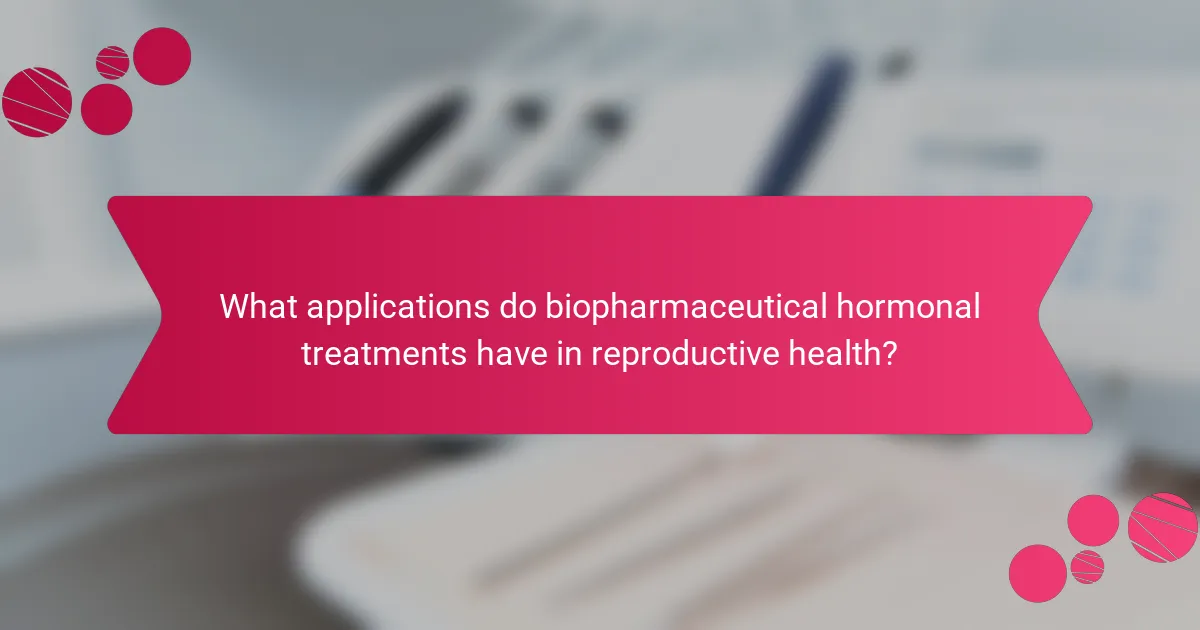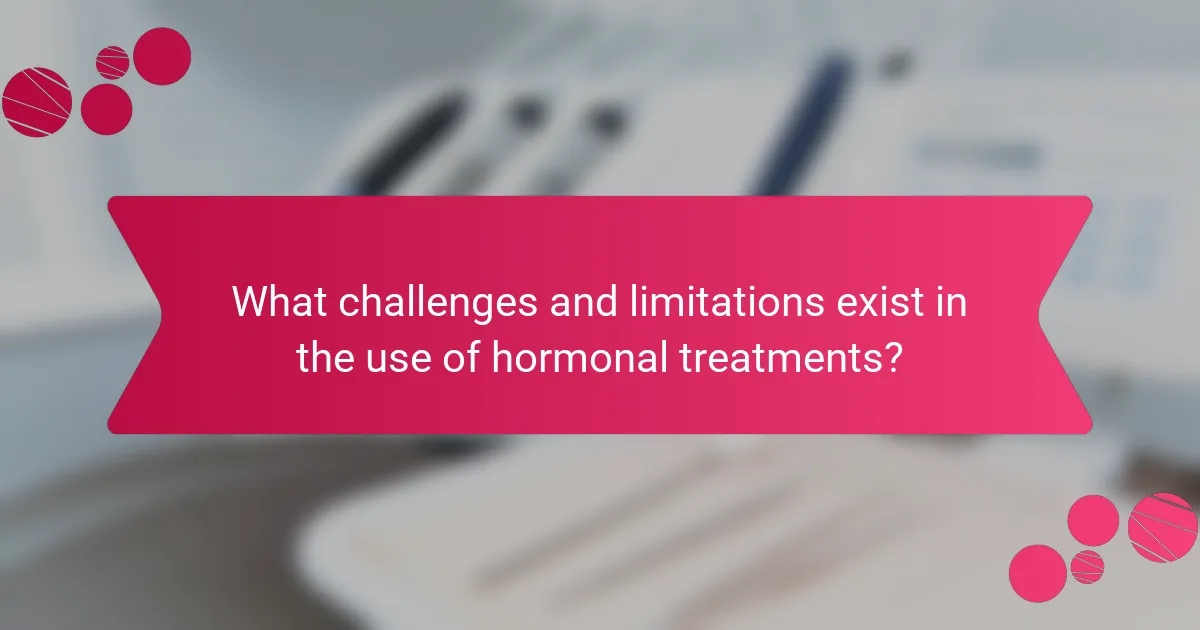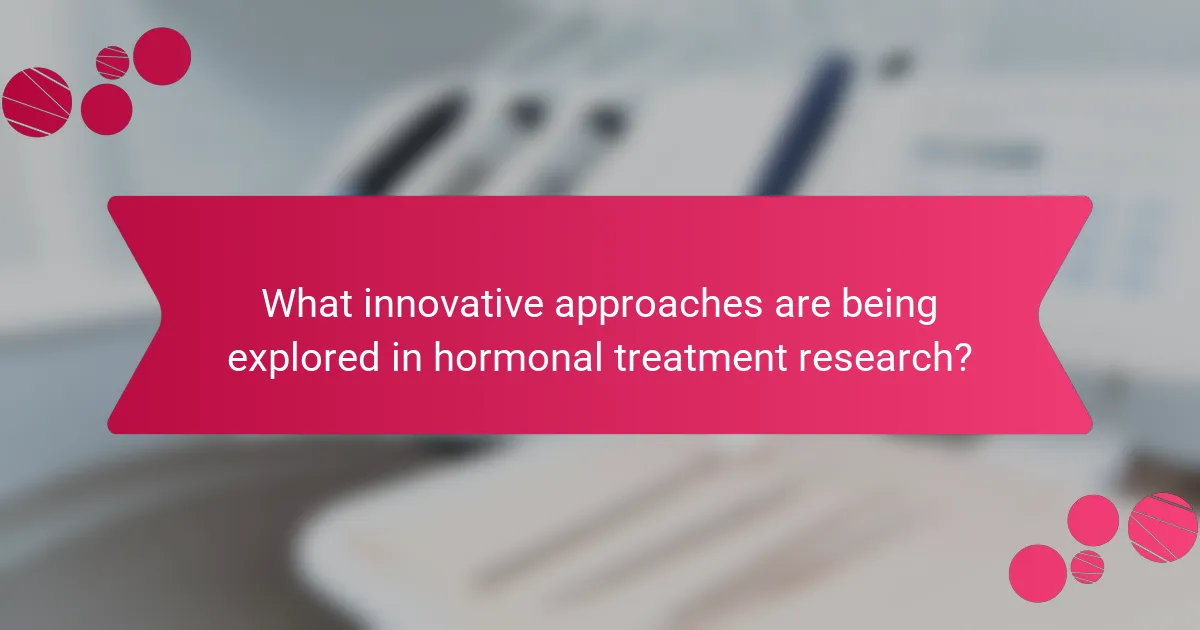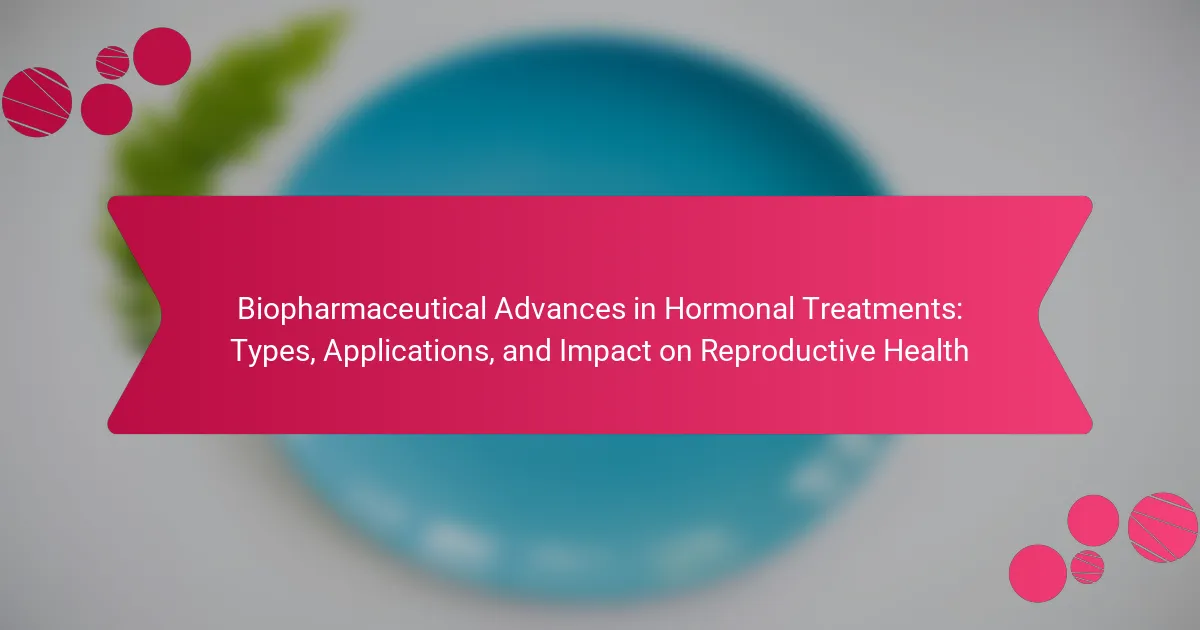Biopharmaceutical advancements are revolutionising hormonal treatments, enhancing efficacy and minimising side effects. This article explores various types of hormonal therapies, their applications in reproductive health, and the significant impact on patient outcomes. Innovations in personalised medicine and drug delivery systems are also discussed, highlighting their role in improving treatment adherence and overall reproductive health.

How are biopharmaceutical advancements transforming hormonal treatments?
Biopharmaceutical advancements are significantly enhancing hormonal treatments by improving efficacy and reducing side effects. These innovations include biologics and targeted therapies that optimise hormone regulation in reproductive health.
Recent developments focus on personalised medicine, tailoring treatments based on individual genetic profiles. For instance, monoclonal antibodies are being utilised to target specific hormonal pathways, leading to more effective management of conditions like infertility and hormonal imbalances.
Moreover, advancements in drug delivery systems, such as long-acting injectables, provide sustained hormone levels, improving patient adherence and outcomes. These methods allow for more consistent therapeutic effects, minimising fluctuations associated with traditional treatments.
The impact of these advancements also extends to improved diagnostic tools that facilitate early detection of hormonal disorders, enabling timely interventions. As a result, patients experience better overall reproductive health and quality of life.
What key technologies are driving innovation in hormonal therapies?
Key technologies driving innovation in hormonal therapies include gene editing, biologics, and advanced drug delivery systems. These technologies enhance precision, efficacy, and patient compliance in reproductive health treatments. For example, CRISPR technology allows targeted modifications to hormonal pathways, while biologics provide new therapeutic options for hormone-related disorders. Additionally, novel drug delivery methods improve the bioavailability of hormonal treatments, optimising their impact on reproductive health outcomes.
Which biopharmaceutical companies are leading the charge in hormonal treatment development?
Several biopharmaceutical companies are at the forefront of hormonal treatment development. Key players include Pfizer, Merck, and AbbVie, which focus on innovative therapies for reproductive health. These companies are advancing treatments for conditions like hormonal imbalances and infertility. Their research emphasises the impact of hormonal therapies on overall reproductive health, aiming to improve patient outcomes.

What are the different types of hormonal treatments available today?
There are several types of hormonal treatments available today, including hormone replacement therapy, contraceptive pills, and fertility medications. Each treatment serves distinct applications in reproductive health.
Hormone replacement therapy (HRT) is primarily used to alleviate symptoms of menopause by providing oestrogen and progesterone. Contraceptive pills regulate menstrual cycles and prevent pregnancy through synthetic hormones. Fertility medications stimulate ovulation and enhance reproductive capabilities.
These treatments have significantly impacted reproductive health, improving quality of life and enabling family planning. Advances in biopharmaceuticals continue to enhance the effectiveness and safety of these hormonal treatments.
How do synthetic hormones differ from natural hormones in biopharmaceutical applications?
Synthetic hormones are chemically manufactured, while natural hormones are derived from biological sources. In biopharmaceutical applications, synthetic hormones offer consistency and precision in dosage, which enhances their effectiveness in treatments. Natural hormones, however, may provide a more holistic approach, mimicking the body’s natural processes. Synthetic hormones can be tailored for specific therapeutic effects, whereas natural hormones have a broader range of bioactivity. Both types significantly impact reproductive health, with synthetic options often used for hormone replacement therapies and natural hormones utilised for fertility treatments.
Which hormonal treatments are most commonly prescribed for reproductive health issues?
Hormonal treatments commonly prescribed for reproductive health issues include contraceptives, hormone replacement therapy (HRT), and fertility medications. These treatments address conditions like polycystic ovary syndrome (PCOS), endometriosis, and menopause symptoms.
Contraceptives regulate menstrual cycles and alleviate symptoms of hormonal imbalances. HRT helps manage menopause-related symptoms, improving quality of life. Fertility medications stimulate ovulation, enhancing chances of conception.
The impact of these treatments on reproductive health is significant, providing relief and improving reproductive outcomes for many individuals.

What applications do biopharmaceutical hormonal treatments have in reproductive health?
Biopharmaceutical hormonal treatments significantly enhance reproductive health by addressing various conditions. They are used to regulate menstrual cycles, manage menopause symptoms, and treat infertility. These treatments include hormone replacement therapy, ovulation induction medications, and contraceptives. The impact of these therapies is profound, improving quality of life and reproductive outcomes for many individuals.
How are hormonal treatments used in fertility treatments?
Hormonal treatments play a crucial role in fertility treatments by regulating reproductive hormones. These treatments include medications like gonadotropins and clomiphene citrate, which stimulate ovulation and enhance fertility. They are tailored to individual needs based on specific hormonal imbalances. As a result, hormonal treatments can significantly improve the chances of conception for those facing infertility challenges.
What role do hormonal therapies play in managing menopause symptoms?
Hormonal therapies significantly alleviate menopause symptoms by restoring hormone levels. These treatments include oestrogen therapy, progesterone therapy, and combination therapies, each tailored to individual needs. Oestrogen therapy effectively reduces hot flashes and vaginal dryness, while progesterone helps protect against uterine lining thickening. Combination therapies can provide broader symptom relief. The impact of these therapies on reproductive health is profound, enhancing quality of life during menopause.
How do hormonal treatments impact conditions like PCOS and endometriosis?
Hormonal treatments significantly alleviate symptoms of PCOS and endometriosis by regulating hormonal imbalances. These treatments, including oral contraceptives and anti-androgens, can reduce menstrual irregularities and manage pain.
For PCOS, hormonal therapies often target insulin resistance and excess androgen levels, improving fertility and metabolic health. In contrast, treatments for endometriosis focus on suppressing oestrogen to shrink endometrial tissue and alleviate pain.
Clinical studies indicate that hormonal treatments can decrease the severity of symptoms in up to 80% of women with endometriosis. Moreover, long-term use of these therapies has shown positive impacts on reproductive health, enhancing quality of life.
Ultimately, the effectiveness of hormonal treatments varies based on individual health profiles, emphasising the need for personalised medical approaches.

What are the benefits of biopharmaceutical hormonal treatments for patients?
Biopharmaceutical hormonal treatments offer significant benefits for patients, including improved reproductive health, symptom relief, and disease management. These treatments can regulate hormonal imbalances, enhance fertility, and reduce the risk of hormone-related conditions. For example, therapies like bioidentical hormone replacement therapy can alleviate menopausal symptoms effectively. As a result, patients experience a better quality of life and overall health outcomes.
How do these treatments improve quality of life for individuals with hormonal imbalances?
Biopharmaceutical treatments significantly enhance the quality of life for individuals with hormonal imbalances by restoring hormonal balance and alleviating symptoms. These treatments, such as hormone replacement therapy, can reduce mood swings, improve energy levels, and enhance reproductive health. As a result, individuals experience better emotional well-being and physical health. The unique attribute of biopharmaceuticals lies in their targeted delivery, which minimises side effects compared to traditional therapies.
What are the long-term health outcomes associated with hormonal treatments?
Long-term health outcomes associated with hormonal treatments can include improved reproductive health, reduced symptoms of hormonal imbalances, and potential risks like cardiovascular issues. Research indicates that hormonal therapies, such as oestrogen and progesterone, can enhance quality of life by alleviating symptoms of menopause and other hormonal disorders. However, some studies suggest an increased risk of certain cancers and thromboembolic events with prolonged use. Monitoring and individualised treatment plans are essential for optimising benefits while minimising risks.

What challenges and limitations exist in the use of hormonal treatments?
Hormonal treatments face several challenges and limitations. These include side effects, varying individual responses, and accessibility issues.
Side effects can range from mild to severe, impacting patient adherence. Individual responses to treatments differ due to genetic factors, which complicates standardisation. Additionally, hormonal treatments may not be readily accessible in all regions, limiting their effectiveness.
Furthermore, the long-term impact of hormonal treatments on reproductive health remains under-researched, creating uncertainty for patients and healthcare providers. These factors collectively hinder the optimal use of hormonal therapies in reproductive health.
What are the common side effects of biopharmaceutical hormonal therapies?
Common side effects of biopharmaceutical hormonal therapies include nausea, fatigue, weight gain, mood swings, and changes in libido. These effects vary based on individual responses and specific therapies used. Hormonal treatments can also lead to unique side effects, such as blood clots or liver dysfunction, depending on the patient’s health status and the type of therapy. Regular monitoring is essential to manage these side effects effectively.
How do regulatory differences affect hormonal treatment availability across regions?
Regulatory differences significantly impact hormonal treatment availability across regions. Variations in approval processes, safety regulations, and market access can create disparities in treatment options. For instance, some countries may have expedited approval for innovative hormonal therapies, while others may require extensive clinical trials, delaying access. This affects patient outcomes and the overall effectiveness of reproductive health initiatives. Additionally, cultural attitudes toward hormonal treatments can influence regulatory stances, further complicating access to these essential therapies.

What innovative approaches are being explored in hormonal treatment research?
Innovative approaches in hormonal treatment research include gene therapy, personalised medicine, and bioengineered hormones. Researchers are exploring gene editing techniques to address hormonal imbalances at the genetic level. Personalised medicine tailors treatments based on individual genetic profiles, enhancing effectiveness. Bioengineered hormones offer improved stability and efficacy, addressing specific reproductive health issues. These advances aim to optimise treatment outcomes and minimise side effects.
Which rare hormonal treatments are showing promise in clinical trials?
Several rare hormonal treatments are demonstrating potential in clinical trials, including kisspeptin, which stimulates gonadotropin release, and oxytocin, known for its role in social bonding. Additionally, therapies targeting the luteinising hormone receptor are under investigation for their efficacy in reproductive health. These treatments may offer new avenues for addressing hormonal imbalances and infertility.
How is personalised medicine influencing the future of hormonal treatments?
Personalised medicine is reshaping hormonal treatments by tailoring therapies to individual genetic profiles. This approach enhances treatment efficacy and minimises side effects, particularly in reproductive health. Advances in biopharmaceuticals enable targeted therapies that address specific hormonal imbalances. For instance, pharmacogenomics allows clinicians to predict patient responses to hormonal therapies based on genetic variations. As a result, personalised hormonal treatments are becoming more precise, leading to improved patient outcomes and satisfaction.

What impact do biopharmaceutical hormonal treatments have on reproductive health outcomes?
Biopharmaceutical hormonal treatments significantly improve reproductive health outcomes. These therapies can regulate hormonal imbalances, enhance fertility rates, and manage conditions such as polycystic ovary syndrome (PCOS) and endometriosis. For instance, treatments like gonadotropins and hormonal contraceptives have shown effectiveness in restoring ovulation and menstrual regularity. Additionally, advancements in personalised medicine allow for tailored approaches, optimising treatment efficacy based on individual patient profiles. As a result, these treatments contribute to better reproductive health and overall quality of life for many individuals.
How are patient experiences shaping the development of new hormonal therapies?
Patient experiences significantly influence the development of new hormonal therapies by providing insights into effectiveness and side effects. Feedback from patients helps researchers prioritise treatment options that enhance quality of life. For instance, real-world data reveals preferences for less invasive methods and fewer side effects, guiding innovation. This patient-centred approach fosters the creation of therapies that align with individual needs, ultimately improving reproductive health outcomes. Additionally, understanding patient experiences can lead to unique attributes in hormonal treatments, such as personalised dosing and tailored delivery systems.
What metrics are used to assess the effectiveness of hormonal treatments in reproductive health?
Hormonal treatment effectiveness in reproductive health is assessed using metrics such as hormonal levels, cycle regularity, pregnancy rates, and symptom relief. Hormonal levels indicate treatment impact, while cycle regularity reflects hormonal balance. Pregnancy rates measure success in achieving conception, and symptom relief gauges patient satisfaction. These metrics provide comprehensive insights into treatment efficacy.
What best practices should patients follow when considering hormonal treatments?
Patients should consult healthcare professionals, understand treatment options, and monitor their health closely when considering hormonal treatments. Research shows that informed decision-making enhances treatment outcomes. It is vital to discuss potential side effects, dosage, and duration of therapy with a physician. Additionally, patients should consider their unique health history and lifestyle factors that may influence treatment efficacy. Regular follow-up appointments are essential to assess progress and make necessary adjustments.
